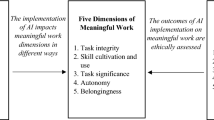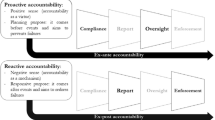Abstract
This article is the author’s review of the singularity in which events in the field of artificial intelligence (AI) are developing. A general view is offered on the role of revolutions in information technology as they expand the human personality. The current stage of personal expansion is considered, covering the last decade, especially 2023. The most important and common socially significant documents expressing concern about AI, as well as those that assert an optimistic view of events, are considered: ethical principles, important directions, requirements, and restrictions. It takes a closer look at the pending European AI Act (AIA) and how different groups are reacting to it. Cultural and historical factors are highlighted that can counteract the negative and catastrophic developments that may result from AI. Possible mechanisms for preserving genuine knowledge among professionals and disseminating it among the general public are analyzed.
Similar content being viewed by others
REFERENCES
“On usage of microcalculators in educational process (instructive-methodological writing),” Mat. Shkole, No. 3, 6–8 (1982).
“Decree of the Central Committee of the USSR Communist Party and the USSR Council of Ministers on March 28, 1985 no. 271 On the Measures on Providing Computer Literacy in Students of Higher Schools and Wide Propagation of Computing Machinery into the Educational Process,” Vopr. Obraz., No. 3, 341–346 (2005). http://vo.hse.ru/arhiv.aspx?catid=252&z=808&t_no= 809&ob_no=854. Cited September 3, 2023.
J. McCarthy, “What is artificial intelligence?” (Stanford Univ., Stanford, USA, 2007). http://www-formal.stanford.edu/jmc/. Cited October 31, 2023.
L. S. Vygotskii, “The instrumental method in psychology” (1981). https://www.marxists.org/archive/vygotsky/works/1930/instrumental.htm. Cited October 31, 2023.
A. L. Semenov and K. E. Ziskin, “Expanded personality as the main entity and subject of philosophical analysis: Implications for education,” Dokl. Math. 108, 331–341 (2023). https://doi.org/10.1134/S1064562423700965
L. Floridi, The Fourth Revolution: How the Infosphere Is Reshaping Human Reality (Oxford Univ. Press, 2014). https://www.academia.edu/14408794/The_Fourth_Revolution_How_the_Infosphere_is_Reshaping_Human_ Reality. Cited October 31, 2023.
Cochlear implant. https://en.wikipedia.org/wiki/Cochlear_implant. Cited October 31, 2023.
Plato, “Phaedrus, 274c–275b,” in Collected Works in 4 Volumes (Mysl’, Moscow, 1971), Vol. 3, pp. 455–542.
M. Suleyman, “My new Turing test would see if AI can make $1 million,” MIT Technol. Rev. (2023). https://www.technologyreview.com/2023/07/14/1076296/ mustafa-suleyman-my-new-turing-test-would-see-if-ai-can-make-1-million/. Cited October 31, 2023.
Education is not in studying the facts, but in training the thinking. https://theocrat.ru/eng/content-64698/. Cited October 31, 2023.
Future of Life Institute. https://futureoflife.org/. Cited October 31, 2023.
S. Russell, D. Dewey, and M. Tegmark, “Research priorities for robust and beneficial artificial intelligence,” AI Mag. 36 (4), 105–114 (2015). https://doi.org/10.1609/aimag.v36i4.2577
The Asilomar AI principles (2017). https://futureoflife.org/open-letter/ai-principles/. Cited October 31, 2023.
Pause giant AI experiments: An open letter (2023). https://futureoflife.org/open-letter/pause-giant-ai-experiments/. Cited October 31, 2023.
As six-month pause letter expires, experts call for regulation on advanced AI development (2023). https://futureoflife.org/ai/six-month-letter-expires/. Cited October 31, 2023.
FLI recommendations for the UK Global AI Safety Summit, Bletchley Park (2023). https://futureoflife.org/wp-content/uploads/2023/09/FLI_AI_Summit_ Recommendations.pdf. Cited October 31, 2023.
Ethics codex in the AI sphere, AI Alliance Russia. https://ethics.a-ai.ru/. Cited October 31, 2023.
AI Alliance Russia. https://a-ai.ru/. Cited October 31, 2023.
Recommendation on the Ethics of Artificial Intelligence, UNESCO (2021). https://unesdoc.unesco.org/ark:/48223/pf0000381137. Cited October 31, 2023.
Statement of AI Risk: AI experts and public figures express their concern about AI risk, Center of IA Sagety. https://www.safe.ai/statement-on-ai-risk.
Fact Sheet: Biden–Harris administration secures voluntary commitments from leading artificial intelligence companies to manage the risks posed by AI. https://www.whitehouse.gov/briefing-room/statements-releases/2023/07/21/fact-sheet-biden-harris-administration-secures-voluntary-commitments-from-leading-artificial-intelligence-companies-to-manage-the-risks-posed-by-ai/. Cited October 31, 2023.
Ensuring Safe, Secure, and Trustworthy AI. https://www.whitehouse.gov/wp-content/uploads/2023/ 07/Ensuring-Safe-Secure-and-Trustworthy-AI.pdf. Cited October 31, 2023.
S. Jeans, “The first AI Insight Forum: when tech titans, lawmakers, and critics converge,” Daily AI (2023). https://dailyai.com/2023/09/the-first-ai-forum-when-tech-titans-lawmakers-and-critics-converge/. Cited October 31, 2023.
DeepMind alignment team opinions on AGI ruin arguments (2022). https://www.lesswrong.com/posts/qJgz2YapqpFEDTLKn/deepmind-alignment-team-opinions-on-agi-ruin-arguments. Cited October 31, 2023.
AI and the future of humanity. Yuval Noah Harari at the Frontiers Forum. April 29, 2023. Montreux, Switzerland. https://www.youtube.com/watch?v=LWiM-LuRe6w. Cited October 31, 2023.
S. Jeans, “Digital colonialism in the age of AI and machine learning,” Daily AI (2023). https://dailyai.com/2023/10/digital-colonialism-in-the-age-of-ai-and-machine-learning/. Cited October 31, 2023.
Open Letter to Generative AI Leaders. https://actionnetwork.org/petitions/authors-guild-open-letter-to-generative-ai-leaders. Cited October 31, 2023.
Open Letter: Artists Using Generative AI Demand Seat at Table from US Congress. https://creativecommons.org/about/policy-advocacy-copyright-reform/ open-letter-artists-using-generative-ai-demand-seat-at-table-from-us-congress/. Cited October 31, 2023.
Proposal for a Regulation of the European Parliament and of the Council Laying Down Harmonised Rules on Artificial Intelligence (Artificial Intelligence Act) and Amending Certain Union Legislative Acts (Brussels, 2021). https://eur-lex.europa.eu/legal-content/EN/TXT/ HTML/?uri=CELEX:52021PC0206&from=EN. Cited October 31, 2023.
V. Nizov, “EU AIA, or how should we organize the lawmaking process,” Portal zakon.ru (2023). https://zakon.ru/blog/2023/05/17/eu_aia_ili_kak_ nuzhno_organizovyvat_zakonotvorcheskij_process. Cited October 31, 2023.
M. Butcher, “European VCs and tech firms sign open letter warning against over-regulation of AI in draft EU laws,” TechCrunch.com (2023). https://techcrunch.com/2023/06/30/european-vcs-tech-firms-sign-open-letter-warning-against-over-regulation-of-ai-in-draft-eu-laws/. Cited October 31, 2023.
European business leaders, startup founders, and investors call for regulating AI foundation models under the EU AI Act (2023). https://www.ai-statement.com/. Cited October 31, 2023.
G. Verdi, “General-Purpose AI fit for European small-scale innovators” (2022). https://www.digitalsme.eu/general-purpose-ai-fit-for- european-small-scale-innovators/. Cited October 31, 2023.
G7 Hiroshima Process on Generative Artificial Intelligence (AI): Towards a G7 Common Understanding on Generative AI (Organisation for Economic Co-Operation and Development (OECD), 2023). https://doi.org/10.1787/bf3c0c60-en
Hiroshima Process International Code of Conduct for Advanced AI Systems (2023). https://digital-strategy.ec.europa.eu/en/library/hiroshima-process-international-code-conduct-advanced-ai-systems. Cited October 31, 2023.
“Hiroshima Artificial Intelligence Process: EU Commission welcomes voluntary code of conduct for AI developers,” EU Today (2023). https://eutoday.net/hiroshima-artificial-intelligence-process/. Cited October 31, 2023.
J. Coghlan, “Consumer surveys show a growing distrust of AI and firms that use it,” Cointelegraph (2023). https://cointelegraph.com/news/consumers-increase-distrust-artificial-intelligence-salesforce-survey. Cited October 31, 2023.
K. Haan, “Over 75% of consumers are concerned about misinformation from artificial intelligence,” Forbs Advisor (2023). https://www.forbes.com/advisor/business/artificial-intelligence-consumer-sentiment/. Cited October 31, 2023.
N. Vavilov, “Reshaping the metaphor of proof,” Philos. Trans. R. Soc. A: Math., Phys. Eng. Sci. 377, 20180279 (2019). https://doi.org/10.1098/rsta.2018.0279
A consumer checklist on protecting consumers from the risks of AI, The European Consumer Organization (2022). https://www.beuc.eu/sites/default/files/publications/beuc-x-2022-039_protecting_consumers_from_the_risks_of_ai_-_a_consumer_checklist.pdf. Cited October 31, 2023.
Knowledge arc of the Lomonosov Moscow State University, Information System of the Lomonosov Moscow State University. https://arc.msu.ru/. Cited October 31, 2023.
V. V. Goryachko, A. S. Bubnov, E. N. Raevskii, and A. L. Semenov, “Digital ark of knowledge,” Dokl. Math. 106, S113–S117 (2022). https://doi.org/10.1134/S1064562422060096
A. L. Semenov, A. E. Abylkasymova, and S. A. Polikarpov, “Foundations of mathematical education in the digital age,” Dokl. Math. 107, S1–S9 (2023). https://doi.org/10.1134/S1064562423700564
A. L. Semenov and A. E. Abylkasymova, “Digital technologies as a factor of succession in learning mathematics,” in Fundamental Problems of Learning Mathematics and Informatics and of Informatization of Education: Proc. Int. Sci. Conf. (Eletskii Gosudarstvennyi Universitet im. I.A. Bunina, Elets, Lipetsk oblast, 2023), pp. 10–15.
D. F. Aliev and S. A. Borodulina, “Project of the platform of social scoring (materials to the Scientific Council of the Russian State Social University),” RGSU Life (2022). https://rgsu.net/about/activities/press_centre/life/platform/rgsu-life_20.html. Cited October 31, 2023.
“Authorities warn public against AI fraud World Internet Conference,” China Daily (2023). https://www.wicinternet.org/2023-06/01/c_891623.htm. Cited October 31, 2023.
Funding
This work was supported by ongoing institutional funding. No additional grants to carry out or direct this particular research were obtained.
Author information
Authors and Affiliations
Corresponding author
Ethics declarations
The author of this work declares that he has no conflicts of interest.
Additional information
Publisher’s Note.
Pleiades Publishing remains neutral with regard to jurisdictional claims in published maps and institutional affiliations.
Rights and permissions
About this article
Cite this article
Semenov, A.L. Artificial Intelligence in Society. Dokl. Math. 108 (Suppl 2), S168–S178 (2023). https://doi.org/10.1134/S106456242355001X
Received:
Revised:
Accepted:
Published:
Issue Date:
DOI: https://doi.org/10.1134/S106456242355001X




